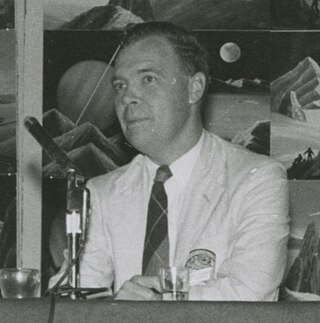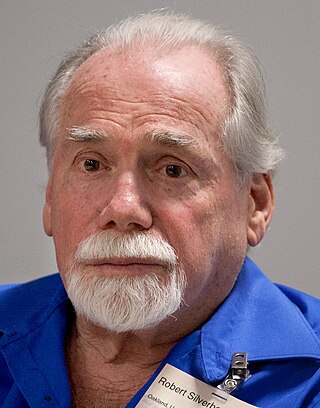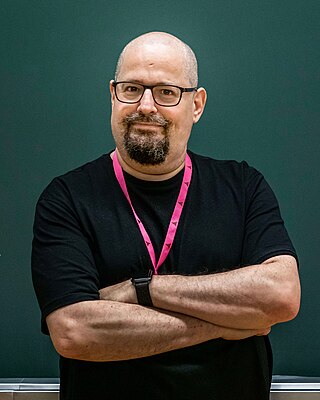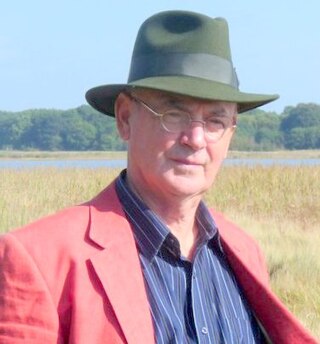
Brian Wilson Aldiss was an English writer, artist and anthology editor, best known for science fiction novels and short stories. His byline reads either Brian W. Aldiss or simply Brian Aldiss, except for occasional pseudonyms during the mid-1960s.
Dan Simmons is an American science fiction and horror writer. He is the author of the Hyperion Cantos and the Ilium/Olympos cycles, among other works that span the science fiction, horror, and fantasy genres, sometimes within a single novel. Simmons's genre-intermingling Song of Kali (1985) won the World Fantasy Award. He also writes mysteries and thrillers, some of which feature the continuing character Joe Kurtz.

Harry Clement Stubbs, better known by the pen name Hal Clement, was an American science fiction writer and a leader of the hard science fiction subgenre. He also painted astronomically oriented artworks under the name George Richard.

Alice Bradley Sheldon was an American science fiction and fantasy author better known as James Tiptree Jr., a pen name she used from 1967 until her death. It was not publicly known until 1977 that James Tiptree Jr. was a woman. From 1974 to 1985, she also occasionally used the pen name Raccoona Sheldon. Tiptree was inducted into the Science Fiction Hall of Fame in 2012.

A novella is a narrative prose fiction whose length is shorter than most novels, but longer than most novelettes and short stories. The English word novella derives from the Italian novella meaning a short story related to true facts.

Linda Nagata is a Hawaii-based American author of speculative fiction, science fiction, and fantasy novels, novellas, and short stories. Her novella Goddesses was the first online publication to win the Nebula Award. She frequently writes in the Nanopunk genre, which features nanotechnology and the integration of advanced computing with the human brain.

Joe William Haldeman is an American science fiction author.

Robert Silverberg is a prolific American science fiction author and editor. He is a multiple winner of both Hugo and Nebula Awards, a member of the Science Fiction and Fantasy Hall of Fame, and a Grand Master of SF since 2004.
Ian R. MacLeod is a British science fiction and fantasy writer.

Catherine Ann Asaro is an American science fiction and fantasy author, singer and teacher. She is best known for her books about the Ruby Dynasty, called the Saga of the Skolian Empire.

Charles David George "Charlie" Stross is a British writer of science fiction and fantasy. Stross specialises in hard science fiction and space opera. Between 1994 and 2004, he was also an active writer for the magazine Computer Shopper and was responsible for its monthly Linux column. He stopped writing for the magazine to devote more time to novels. However, he continues to publish freelance articles on the Internet.

Nancy Anne Kress is an American science fiction writer. She began writing in 1976 but has achieved her greatest notice since the publication of her Hugo- and Nebula-winning novella Beggars in Spain (1991), which became a novel in 1993. She also won the Nebula Award for Best Novella in 2013 for After the Fall, Before the Fall, During the Fall, and in 2015 for Yesterday's Kin. In addition to her novels, Kress has written numerous short stories and is a regular columnist for Writer's Digest. She is a regular at Clarion Workshops. During the winter of 2008/09, Nancy Kress was the Picador Guest Professor for Literature at the University of Leipzig's Institute for American Studies in Leipzig, Germany.

Kate Wilhelm was an American author. She wrote novels and stories in the science fiction, mystery, and suspense genres, including the Hugo Award–winning Where Late the Sweet Birds Sang. Wilhelm established the Clarion Workshop along with her husband Damon Knight and writer Robin Scott Wilson.

Lucius Shepard was an American writer. Classified as a science fiction and fantasy writer, he often leaned into other genres, such as magical realism.
Bradley Clayton Denton is an American science fiction author. He has also written other types of fiction, such as the black comedy of his novel Blackburn, about a sympathetic serial killer.

Elizabeth Hand is an American writer.

Sarah Bear Elizabeth Wishnevsky is an American author who works primarily in speculative fiction genres, writing under the name Elizabeth Bear. She won the 2005 John W. Campbell Award for Best New Writer, the 2008 Hugo Award for Best Short Story for "Tideline", and the 2009 Hugo Award for Best Novelette for "Shoggoths in Bloom". She is one of a small number of writers who have gone on to win multiple Hugo Awards for fiction after winning the John W. Campbell Award for Best New Writer.

Garry Douglas Kilworth is a British science fiction, fantasy and historical novelist, and a former Royal Air Force cryptographer.
Thomas P. Kratman is an American military science fiction author and retired United States Army officer whose work is published by Baen Books. Kratman's novels include the Desert Called Peace series which has been praised for its action sequences and attention to philosophy of war. He authored three novels with John Ringo in the Legacy of the Aldenata series. Kratman's works often reflect right-wing political perspectives and some have been seen as deliberately crafted to offend left-wing sensibilities. During the Sad Puppies campaign in 2015, Kratman was nominated for a Hugo Award for his novella Big Boys Don't Cry.
Jonathan Pace Brazee is a retired US Marine infantry colonel and author of speculative fiction, active in the field since 2010, with one story published much earlier in 1979.















